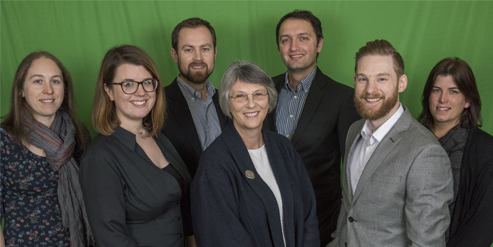16 March 2016

March 2015 saw the launch of the consultation on the Cambridge Mathematics Framework by Lynne McClure, Director of Cambridge Mathematics, marking the first step of the five year Cambridge Mathematics development programme. Twelve months on and a lot has happened, including the building of a Cambridge Maths team to include developers, researchers and communicators.
To mark the first year, the Cambridge Mathematics Education Community came together last week to hear the latest updates on the programme and share news of their own projects. The community heard about:
- the launch of the Maths Faculty’s Underground Maths, providing online A Level teaching resources
- a review of International A Level Maths syllabuses by Cambridge International Examinations, including extensive work with focus groups
- Cambridge University Press’ international reach and publications resulting from revised OCR and Cambridge International Examinations syllabuses
- the publication of David Spiegelhalter’s new book ‘Teaching Probability’, the first product developed in partnership with Cambridge Mathematics
- the publication of AIMSSEC’s teacher resource book.
At the event Lynne commented on how far the team and the programme had come in a year and what great wealth of knowledge the community was sharing. She said the road ahead is looking exciting and challenging.
The creation of Cambridge Mathematics
Cambridge Mathematics is a collaborative enterprise supported by four departments of the University and their teams. These partners are represented and kept informed through the Cambridge Mathematics Education Community, a group of like-minded individuals working in the field of maths education across the University.
The vision for the programme stemmed initially from dissatisfaction with the direction UK maths education was taking and a desire to harness the intellectual expertise of the University’s various departments to consider what an international maths curriculum could look like. Starting with a clean sheet and allowing room for blue sky thinking, the outcome will be a framework firmly rooted in research and expertise, identifying the experiences students should have at different ages from 5 to 19, supported by teaching and learning resources, assessment and professional development. It will embody, in the words of Tim Oates, characteristics of curriculum coherence.
Rachael Horsman, Ellen Jameson and Lucy Rycroft-Smith are responsible for researching the international research evidence, developing the Framework and communicating with the growing audience. They are considering different ways of embedding the interconnectedness of mathematics, and the authentic use of digital technology into the structure of the Framework. The final version will need to be documented in an online format that is useable, can be queried to service many different aspects such as a programme of study, resources around a theme, or assessments at a particular level.
In addition to the Cambridge-based team Cambridge Mathematics has:
- a governance body representing each of the partners
- the Cambridge Mathematics Education Community (colleagues from across each of the University’s partners)
- two advisory groups, one UK and one international
- a digital strategy team
- and an ever growing online community of members interested in the programme and contributing to the Framework consultation.
To learn more about Cambridge Mathematics please visit the Cambridge Mathematics website or get in touch with one of the team at info@cambridgemaths.org.